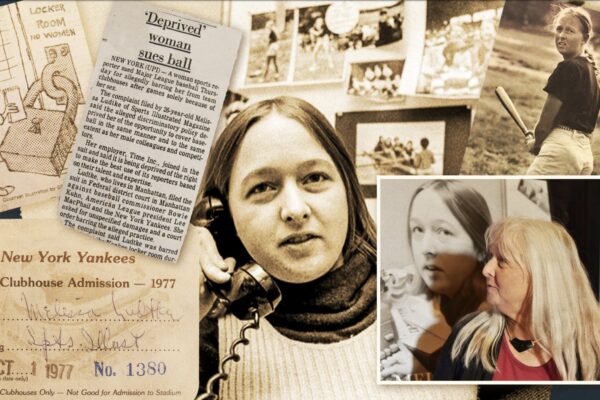By Mike Williams | @MikeWritesSport
Sports Capital Journalism Program
MINNEAPOLIS — After the confetti cannons and net cutting and the traditional playing of “One Shining Moment” within U.S. Bank Stadium late Monday night, Virginia’s Kyle Guy and Ty Jerome sat behind microphones to answer questions about their program’s first national championship. One year earlier, the Cavaliers had faced the media to answer questions as members of the first No. 1 seed to lose in the first round to a No. 16 seed.
Throughout an entire championship season, even if the Cavaliers didn’t want to talk about it, UMBC had been on their minds. Not because they wanted to remember, but because they weren’t allowed to forget.
“Forget last year,” said Jerome. “This is everything you dream of since you’re a little kid. I’m not even thinking about UMBC right now.”
Shortly after the loss to UMBC, Guy downloaded a photo from that game to look at every single day. “I did it as inspiration,” said Guy Friday. “Motivation is short-term, inspiration is long-term. That’s always going to inspire me. I just think it was a life-changing moment on and off the court, and I didn’t want to forget it.”
The road to the 2019 national championship wasn’t an easy one, with enough dramatic twists to create a documentary.
Virginia’s cathartic 85-77 overtime victory over Texas Tech completed a rare stretch in the history of the NCAA tournament. Of the 81 championship teams, just three required overtime in two of their last three games. The Cavaliers joined the 1997 Arizona Wildcats, who defeated Providence in a regional final and Kentucky in the final, and the 1957 North Carolina Tar Heels, who played triple-overtime games on consecutive nights, beating Michigan State in the semifinal and Kansas in the final.
To get to the national championship game, No. 1 seed Virginia had to come back from a double-digit deficit against No. 16 Gardner-Webb in the first round. This year’s championship hero De’Andre Hunter, who missed the 2018 tournament with a wrist injury, scored 23 points in the comeback win. “That (UMBC) will always be part of our story,” said Virginia coach Tony Bennett after the game. “…I’m sure a lot of people thought it was going to be part of our story the second year in a row. But it’s just now, this is a new year.”
After a 63-51 second-round win against Oklahoma, the only game that could have been considered a smooth win during their championship run, the Cavaliers fought off a comeback from 12 seed Oregon to win, 53-49. It was a poor shooting night for the Cavaliers, who only shot 35.7% in the game, but Jerome hit a 3-pointer to retake the lead with 3:33 to play. “I knew this was going to be an important year in all of our lives,” said Bennett after the game. “To come back from behind 14 (to Gardner-Webb) and to continue to advance, that stuff will stay with these guys.”
The final three games of Virginia’s season held comebacks that only add to the allure of the 2019 championship run.
Against Purdue, Virginia trailed 70-67 with just five seconds left in the game. The Cavaliers outscored Purdue 13-5 from those final five seconds through the end of overtime to cap an 80-75 win. After twisting his ankle just before halftime, Guy began a run that would lead to his winning the tournament’s Most Outstanding Player award. He had just four of his game-high 24 points in the first half. He scored his final two points of the game from the free throw line with just five seconds remaining to increase the lead to three.
The semifinal against Auburn, Virginia’s first Final Four appearance in 35 years, appeared lost until Guy’s three free throws with 0.6 seconds to play became the difference in the 63-62 victory.
When speaking to the media before the national semifinal, Bennett spoke on how the loss to UMBC brought the team closer together. “That was such a pivotal moment and devastating in so many ways and humbling that I knew we had to be there for each other in ways we never would have had that not happened,” Bennett said.
For the players, the questions going back to UMBC were unavoidable. “I feel like I get asked this question every single round,” said Jerome after the semifinal victory. “Every round we advance, and every round I say the same thing almost, and it feels a little bit sweeter, a little bit sweeter.”
Guy added, “You guys can ask that question again on Monday.”
They were asked again Monday.
The first question Guy and Jerome faced following the championship win was about their feelings of winning a year after the UMBC. “I was about to say don’t ask me because I can’t yet,” said Jerome.
Guy suggested that the championship run began with the loss to UMBC. “Yeah, we came in together and said that we were going to win a national championship,” he said. “And to be able to hug each other with confetti going everywhere and say we did it, it’s the greatest feeling I’ve ever felt in basketball.”
After more than a year, at long last, Virginia’s humiliation had become a footnote.
“We’ve all had our own battles,” Guy said. “… It’s a really special group because we all had the same why amongst other whys, but to share the same one and to battle everything we battled through and come out on top is a fantastic feeling.”


